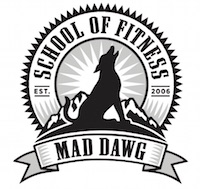I thought I would start a new type of post to add some variety to… well not too much, as I haven’t updated the blog lately. Actually, it is variety for me rather then you, my dear readers. Sometimes I just can’t get started and writing about something I read seems to be much easier than coming up with something from scratch (not sure why this was so hard in school… :-))
I’m Here To Win: A World Champion’s Advice for Peak Performance by Chris McCormack and Tim Vandehey was suggested reading by James FitzGerald (aka OPT). OPT reads a fair amount and he thought it was good, so that’s enough of a recommendation for me. Also most of the non-fiction I read is geared towards strength training and/or mobility so I thought a book by a triathlete would bring me a little diversity.
Many of you might not be familiar with Chris McCormack but he is probably one the best male triathletes in the last decade, maybe ever (if you listen to him). He also has quite a reputation for speaking his mind. Many say he is cocky, but throughout the book he unapologetically explains that he competes to win and while the talk seems to get noticed the most often, his detractors should take note of all the other ways he prepares.
One of the best parts of the book is the story about how he started as a professional triathlete. It is detailed in the chapter titled “Too proud to Go Home.” In a nutshell, he was always a good athlete but after college he decided to quit his accounting job and travel to France to race. He didn’t know anyone there and couldn’t speak the language but he won the first two races he entered. He met some very kind people his first weekend that let him live with them for 5 weeks until he found a triathlon club to train with. Nine weeks after he arrived in France, he had a personal invitation from the president of the ITU to race the World Cup in Quebec, Canada! The chapter ends, as many of the chapters do, with his stats for a chosen year. While the chapter is mostly about his ’96 season, the chapter ends with his ’93 stats (he went to Europe in the summer of ’93 to race the Junior ITU World Championships). He lists how many miles he swam, biked and ran as well as countries visited and flight miles accumulated. This one has always been a hard one for me but this really drove the lesson home, you have to keep records to be successful.
Throughout the book, Macca, Chris McCormack’s nickname, includes sections called Macca’s (W)insights. There are a couple that stand out but this book is worth price if you only read these. One of the first, and I think the most basic, is creating scouting reports. If you want to compete in a race or competition, watch old races or check out the results. Follow athletes you admire on Twitter or Facebook and read interviews with them. Consider your weaknesses and see how other athletes have addressed those same weaknesses. Another useful (W)insight: Carb mixture should be simpler (i.e. closer to the glucose you body is craving) as the race progresses. On the bike or when your heart rate is lower, more complex foods like whole food or processed foods that contain maltodextrin are better. He is very specific about the amounts he takes in which is very helpful. He finishes with “practice this in training.” Another (W)insight dealing with “the mental game” (which is in the “Mind Games” chapter has suggestions for self talk when things get ugly. This is super important, every event is going to get ugly at some point, you absolutely have to have something planned for when that happens otherwise you turn into a “mental milkshake.” One of the things he does is he “greets pain” saying “I’ve been waiting for you, good to see you again” when things start getting ugly.
Finally, the most important chapter is called “Don’t Call Me ‘Fluffy’;” although a close second is “Coke, The Worlds Best Sports Drink.” In the “Fluffy” chapter, McCormick details a 16 week training skeleton program AFTER making sure the reader knows how important rest is to success. He has had very few injuries and he has won a ton of races. I have known how important rest is for a while through reading and my own training but I think this is the first time I have heard an endurance athlete argue the case so forcefully. Have a plan, but leave space for changes dictated by how your body feels. Finally, and most importantly, have a focus for the training session and know what you need to do in that session to get what you are training for. He has a great story about how he had to change his sleeping schedule to get the most out of his early morning swim speed sessions.
On the back of the cover is a sentence that I think summarizes the book: “A goal is a dream with a plan.” This book is filled with fairly detailed descriptions of how Macca has achieved his success. While it is written about a triathlete, almost any athlete can learn something from this book. I will have this book downstairs, check it out, and I bet you will learn something on any page you read.
